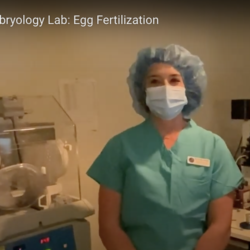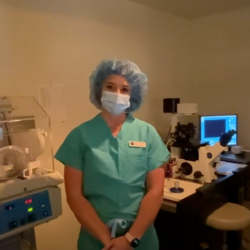
If you just experienced your first failed In Vitro Fertilization (IVF) cycle, you are probably feeling disappointed, sad and frustrated. Even though IVF is the best fertility treatment to help infertile couples achieve pregnancy, it does not work every time. Many women think that their odds of success on the first cycle are 80 percent or more, but unfortunately that is not accurate. The reality is that the live birth IVF success rate for women under 35 years old is approximately 40 percent and it is less for women over 40. The good news is that there are things that can be corrected that could increase your chances for a successful pregnancy in your next cycle.
Why Does IVF Fail?
Many factors influence the success of an IVF cycle. The three most common are the age of the female, the quality of the embryo, and the lack of ovarian response. As women age, they produce fewer ages and the quality of their eggs decline. The decline will begin when a woman reaches her thirties and then accelerate after age 37.
IVF cycles also fail when the embryo quality is poor. Most fertility specialists believe that when embryos fail to implant it is because of either chromosomal or other genetic abnormalities which make them too defective to grow.
Also critical to IVF success is the ability for the ovaries to respond to the fertility medications and produce multiple eggs. When women are unable to produce multiple eggs it is usually because their ovaries have fewer numbers of eggs in reserve than expected. You’re more likely to have a poor ovarian response if you are over 37 and/or have high FSH (follicle stimulating hormone) or low AMH (antimullerian hormone) levels.
Second or Third Rounds of IVF
There is no guarantee that your first cycle will work, but should you require a second or third cycle, there are steps you can take to increase your chance of pregnancy. If your first cycle fails, our reproductive endocrinologist will examine the cause and determine if there were any issues with egg quality or quantity, embryo development, or the transfer of the embryos to your uterus. Your doctor may consider changing the drugs used in the stimulation process, if there were difficulties with ovarian stimulation or egg quantity. If the female partner is older and there were problems with embryo implantation, we may recommend preimplantation genetic screening (PGS) to screen the embryos in your next IVF cycle before implantation. This process requires taking a biopsy from the embryo and testing the cells for their chromosome number. This allows our specialists to choose healthy embryos without the genetic problems which can stop them from growing.
At The Fertility Institute, we find that the highest success rates are achieved with two cycles. The first IVF cycle will transfer one embryo and an additional cycle will utilize a frozen embryo transfer. We find that this provides you with the highest chance of success with the lowest multiple birth rate of any assisted reproductive technology. IVF may not work for everyone, but when the cycle is repeated it can ensure that the procedure is being performed under the optimal conditions.
Finally, if you need to, you can alter your lifestyle to improve your chances of succeeding at IVF. Stop smoking, drinking alcohol or using drugs while attempting IVF and make sure you eat a healthy diet, get enough rest and try to keep stress out of the equation. As IVF treatment continues to become more popular and commonplace, the technology and success rates continue to improve as well. If you have had difficulty trying to conceive, please contact our office to schedule a consultation with one of our doctors to learn more about the benefits of IVF. We look forward to helping you grow your family, and we are prepared to provide compassionate care every step of the way.



